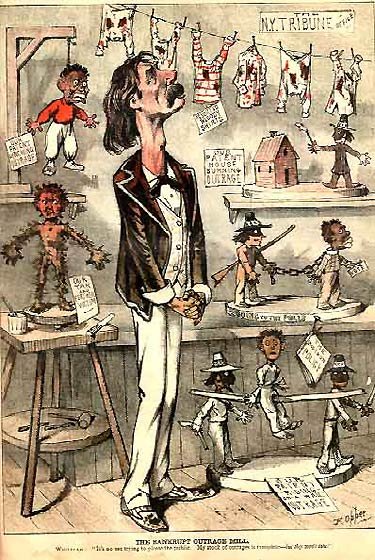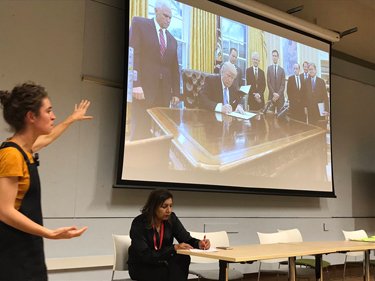The Leftist Radicals Are Still “Waving the Bloody Shirt*” A Century And a Half Later
Critical Racial Theory, Racial Politics, Ressentiment, Waving the Bloody Shirt

1880 Frederick Burr Opper Cartoon from Puck, titled: The Bankrupt Outrage Mill (showing bloody shirts, lynchings, and other forms of racial violence).
* “Waving the Bloody Shirt” was a phrase used by their opponents to mock efforts by post-Civil-War left-wing radicals to sow national division and stir up animosity against the defeated South by invoking memories of the war, and particularly through painting emotional images of black victimhood.
Coleman Hughes quite brilliantly analyses the bizarre role of metaphor as identity underlying the contemporary psychodrama participated in by complaining blacks and pious white liberals.
Though the question seems naïve to some, it is in fact perfectly valid to ask why black people can get away with behavior that white people can’t. The progressive response to this question invariably contains some reference to history: blacks were taken from their homeland in chains, forced to work as chattel for 250 years, and then subjected to redlining, segregation, and lynchings for another century. In the face of such a brutal past, many would argue, it is simply ignorant to complain about what modern-day blacks can get away with.
Yet there we were—young black men born decades after anything that could rightly be called ‘oppression’ had ended—benefitting from a social license bequeathed to us by a history that we have only experienced through textbooks and folklore. And my white Hispanic friend (who could have had a tougher life than all of us, for all I know) paid the price. The underlying logic of using the past to justify racial double-standards in the present is rarely interrogated. What do slavery and Jim Crow have to do with modern-day blacks, who experienced neither? Do all black people have P.T.S.D from racism, as the Grammy and Emmy award-winning artist Donald Glover recently claimed? Is ancestral suffering actually transmitted to descendants? If so, how? What exactly are historical ‘ties’ made of?
We often speak and think in metaphors. For instance, life can have ups and downs and highs and lows, despite the fact that our joys and sorrows do not literally pull our bodies along a vertical axis. Similarly, modern-day black intellectuals often say things like, “We were brought here against our will,” despite the fact that they have never seen a slave ship in their lives, let alone been on one. When metaphors are made explicit—i.e., emotions are vertical, groups are individuals—it’s easy to see that they are just metaphors. Yet many black intellectuals carry on as if they were literal truths.
One such intellectual is Michael Eric Dyson, who recently shared the stage with Michelle Goldberg in a debate against Jordan Peterson and Stephen Fry. Though the debate was ostensibly about political correctness, it ranged everywhere from Marxism to ‘white privilege.’ Around halfway through the debate, Dyson said:
If you have benefitted from 300 years of holding people in servitude, thinking that you did it all on your own…”Why can’t these people work harder?” Let me see…for 300 years you ain’t had no job! So the reality is for 300 years you hold people in the bands…you refuse to give them rights. Then all of a sudden, you ‘free’ them and say, “You’re now individuals.”
Taken literally, Dyson’s claims make no sense. No person has ever suffered 300 years of joblessness because no person has ever lived for 300 years. Of course, Dyson wasn’t speaking literally. His ‘you’ refers not to identifiable, living humans, but to groups of long-deceased individuals with whom he shares nothing in common except a location on the color wheel. But by appropriating a grievance whose rightful owners died long ago, and by slipping between the metaphorical and the literal, Dyson was able to portray himself as a member of an abstract oppressed class and Peterson as a member of an abstract oppressor class. In his reply, barely audible over Dyson’s sanctimonious harangue, Peterson put his finger on this rhetorical sleight-of-hand: “Who is this ‘you’ that you’re referring to?”
Many black progressives use the myth of collective, intergenerational transfers of suffering to exempt themselves from the rules of civil discourse.
RTWT




